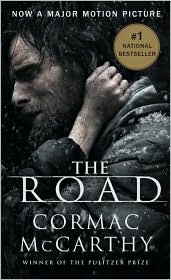 Let me preface this review by saying that I usually hate it when critics label a book as "important". Important? To whom? Can you let me be the judge of what is important in my world please? Things get compounded when when another VIP says the book is the "most important environmental book" you'll ever read.
Let me preface this review by saying that I usually hate it when critics label a book as "important". Important? To whom? Can you let me be the judge of what is important in my world please? Things get compounded when when another VIP says the book is the "most important environmental book" you'll ever read.So it was with a little scepticism that I turned to the first page of The Road.
And was proven wrong almost immediately.
The Road is important. It is essential. It is the most original, hit-you-in-vital-organs-you-never-knew-you-had powerful piece of anything I have read this year. Or any year for that matter.
Defying categorisation, The Road tells of a journey taken by a father and a son. They are nameless, and the landscape they travel through is cauterised, bleak and dead. There are no lengthy explanations of what happened to cause such complete and final destruction to Earth, just tantalising hints. The man and boy are travelling south, to what they hope is warmer weather, and life.
Cormac McCarthy paints the despair and hopelessness of their situation in language at once spare, and heartbreaking. Here is a storyteller with a true gift of poetry; he creates a lexicon for this post-apocalyptic world that, as one reviewer so rightly put it, is Biblical in scope. In an ironic juxtaposition, McCarthy unleashes his potent vocabulary in his descriptions of a world slowly bleeding away its nouns, adjectives, verbs, and interestingly, punctuation, as it becomes more grey and moribund by the season.
The reader is assailed by wave after wave of unavoidable imagery: the greyness "like the onset of some cold glaucoma dimming away the world"; where "(t)he ashes of the late world carried on the bleak and temporal winds to and fro in the void." The countless dead they pass along their journey are conjured up in their full horror: "The flesh cloven along the bones, the ligaments dried to tug and taut as wires. Shriveled and drawn like latterday bogfolk."
The whole situation may seem hopeless to the reader, but really, what can the father and son do? They are "each the other's world entire", and McCarthy reveals the man's thoughts: "He knew only that the child was his warrant. He said: If he is not the word of God God never spoke." So with those words, their journey becomes a quest, the Fisher King roaming the waste land to make it fecund again. (Aside: Sorry, this is the literature student who studied one too many T.S. Eliot poems talking. But I did feel a strong connection between this book and Eliot's The Waste Land.)
To me, reading The Road was like being in a dream, where I'm attending a wake (yes, bring on The Sandman allusions here too). But this is no ordinary wake, I'm sitting there listening to a disembodied voice read out the eulogy for the Earth.
Academic Richard Katula says "that a classic eulogy contains two parts: praise for the dead and advice for the living". In that case, The Road is a post-modern, post-recycling, post-sustainability eulogy then. The dead are not praised. They are forgotten; mummified in their moment of terror and regret. But it is in the living - and I shan't give away any spoilers here - that McCarthy eventually concentrates his message on. I finished the book in a half-daze. knowing that I would tell as many people as I could to read it.
For me, I came away so thankful for what I have, and ashamed at what could be: "Borrowed time and borrowed world and borrowed eyes with which to sorrow it."
1 comment:
Oh Dora.
McCarthy should read this blog. x
Post a Comment